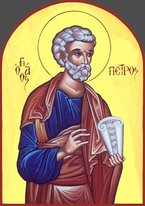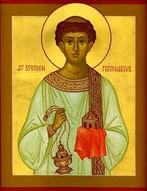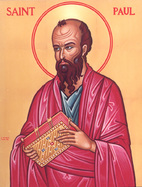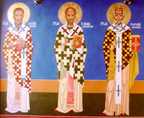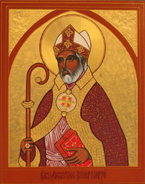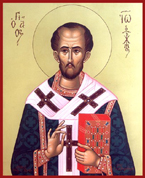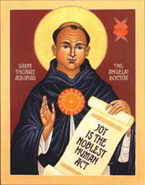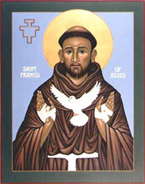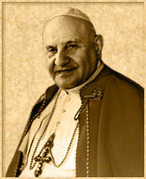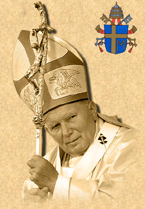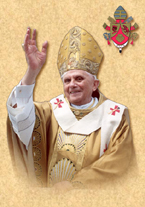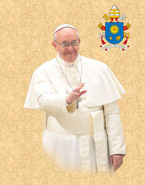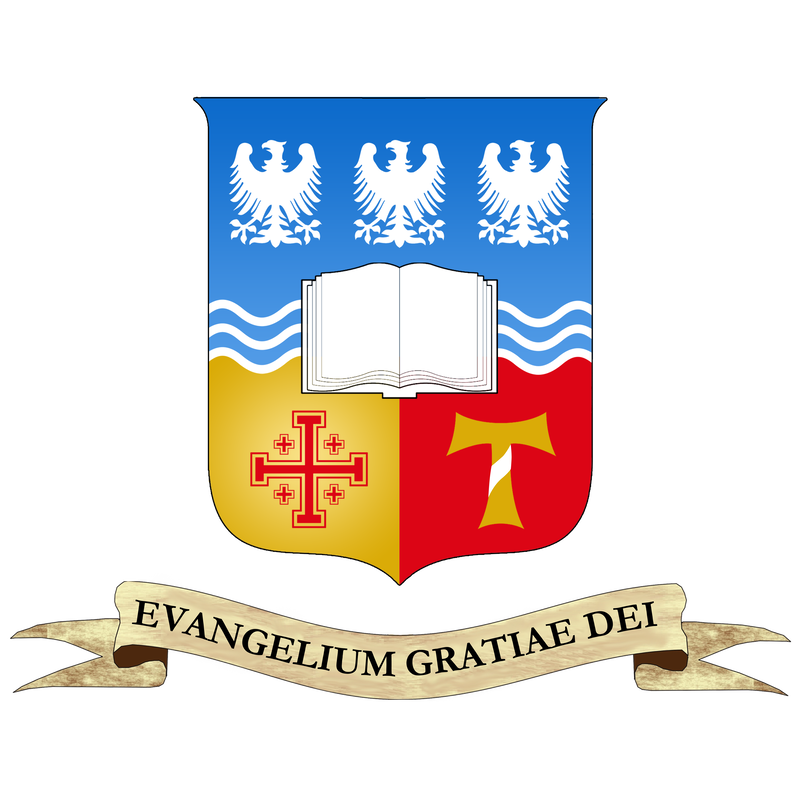Published in The Star 24 March 2013 (Sunday) 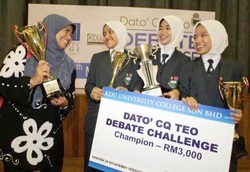 It was girl power as females dominated the competition in the ninth Datuk CQ Teo Debate Challenge at KDU University College recently. The two all-girl teams from Tunku Kurshiah College (TKC) and SMK Assunta, Petaling Jaya, beat their peers in the semi-finals and went head to head in the finals on the topic — this house believes that the people and not the cardinals should elect the pope — with TKC emerging champs. The team from TKC consisted of Marina Mohd Hamdan, 16, Ira Zalis Ismail, 17, and Ilmira Murni Mohd Hareeff, 17. TKC, who formed the government, proposed a three-step mechanism to electing a pope. First, the cardinals would select five candidates who would then prepare their respective portfolios. The people would vote based on the contents of these portfolios. “The pope makes decisions for people within the Catholic church and these decisions affect the people,” said first speaker Ira Zalis Ismail. She added that allowing people to vote also made them take responsibility for the decisions that the elected pope would make. “People will feel closer to their religion and closer to God,” she said. With the debate in full swing from the very start, the other speakers from both sides took their turns to rebut previous arguments and provide their own reasons to support or oppose the motion. While the opposing team of Dhivyaa N. Mailvaganam, 17, Laaviny Nair, 17, and Sofia Anne John, 17, argued that the election of the pope needed to be done by the cardinals so that the religion would not be diluted, the government said that opening the vote to the public would encourage more trust within the church. Both sides were passionate, the opposition more so because of their Catholic background. “While the whole world changes, my religion stays the same. That’s what I find comfort in,” said third speaker Sofia. “Will the Catholic church maintain what it stands for?” she asked in her argument. In the opposition’s reply speech, they reiterated that the proposal for the people to vote for the pope was unnecessary as “discussions and debates already happened within the status quo”. They also added that personal interaction with the pope was needed for the people to vote wisely and since this was limited to the cardinals, they would be in a better position to elect the pope. They reminded the audience that the pope was still human and subject to human behaviour, which created a probability for harm and that people should not be encouraged to follow a specific religion. “It’s supposed to be intrinsic,” said Laaviny. The reply speech from the government was brief. Ilmira Murni Mohd Hareeff, who also won best speaker, had only three points. “Religion does change to suit society,” she reminded the audience, adding that the pope’s job was to guide this process. She added that having the pope elected by commoners would make the pope interact with as many people as he could. “When people have the chance to change the system, they will be more devout. Religion needs to expand to include actual people on the ground.” Up to 60 teams from 60 different schools took part in the three-day event this year. The annual event aimed to promote the spread of English among secondary school students and provide a platform for students to enhance their communication skills. Reactions from the Public I will not be collating all the reactions of various people throughout social media platforms regarding this, but here is just one example (a very well-written one, I must say - the writer shows a good grasp of the mind of the Catholic Church): In The STAR (StarEducate page 26) .... My Own Reaction Okay, obviously I wasn't very upset or angry, although I did perceive that there was an issue here. Nevertheless, it probably wasn't so serious an issue that could diminish the Catholic humour that had infected me since my reception into full communion with the Catholic Church. The "Apology" from KDU On March 17, 2013, the finals of the Dato' CQ Teo Challenge debating competition inadvertently featured a topic that regretfully caused some concern amongst members of the public. Having successfully run the competition for 9 years, the organisers of the competition and KDU University College as sponsors certainly did not mean to offend anyone. The management of KDU University College is taking stringent steps to prevent it from happening in the future. As a 30-year educational institution, we value the benefits robust debate and discussion can bring, and will continue to create opportunities for this to take place, while being sensitive to the beliefs of all Malaysians. Prof Dr Khong Yoon Loong Vice-Chancellor KDU University College My Thoughtful Response In regard to the matter of the notion being set forth by the organisers of the ninth Datuk CQ Teo Debate Challenge recently held at the KDU University College, the following points are my thoughtful response to all reports and communications that have been published so far in print and online: 1. At the outset, I begin by stating that the issue is not such a serious matter so as to warrant another national-level debate on whether such a topic being debated in the public-education square is permissible. It really is no big issue, even from the Catholic perspective. The election of a pope is, to be sure, a matter of faith and dependence upon the Holy Spirit's guidance, but it is also a matter of Church discipline and not unquestionable dogma. Over the centuries, the intricacies of the papal election process have been altered many times, and it is all right for the matter to continue being discussed. 2. But this is where the line might have to be drawn: the discussion is to be undertaken by the CHURCH itself (or at least with the express guidance of the Church), not by spectators. Inner workings of the religious community can be understood only by people within it. And I think it is rudely presumptuous for the organisers of this debate to assume that such a concrete matter could be competently handled and debated by students of other religions and assessed by judges who lack the competence to understand the election mechanism that is being discussed. This is precisely what I would deem offensive, not so much the fact of the topic itself. 3. The Catholic Church is very much at the forefront of interreligious dialogue and welcomes all sorts of conversations about its faith and the beliefs of all other religious peoples. But at the same time, dialogue must be respectful. To debate over a certain religious practice without due consultation with and respect for the justifications of the relevant religious institution for the said practice betrays a lack of simple manners and courtesy. The fact that this debate took place as a series of mere simulated arguments does not diminish this point. 4. I am personally glad that the organisers of this event deemed the recent papal election a matter worthy of discussion and sustained reflection by its students. However, to avoid a misguided sensationalisation of the real scenario, a simple courteous act of inviting an official from the Catholic Church to be present at the said event, and to clarify the mind of the Church regarding this matter at the end of the series of debates, would have been a most respectful gesture. It would have been even better if an official of the Catholic Church had been invited prior to their preparation for the debate to give a lecture (on this topic) to the students and judges in order that they might become well-informed contemplators of the subject in question, not debaters and judges informed by little more than secular ignorance and interpreters of ecclesiastical mechanisms from purely political perspectives. Such a gesture would not then have appeared as if the debate was a "gossip between neighbours" behind the Catholic back. Furthermore, it would have reasonably prevented the organisers and participants from speaking of the papal election process in a way that misinterprets the self-understanding of the Catholic Church. After all, would you want to debate the topic in a way that is reflective of its concrete reality, or would you prefer to debate a straw man that is little more than a figment of your imagination probably by equating the papal election with a Malaysian General Election (which is what I suspect has happened in this recent debate)? 5. Another thing is, having perused the statement of the KDU Vice-Chancellor, it can only be surmised that the organisation regrets the situation in a way that is short of being sorry for having been offensive. They are "regretful" because this debate "has caused some concern among members of the public", not because the approach taken by the organisers itself was intrinsically offensive and disrespectful to one's religious neighbour. In other words, "We are sorry that you have to be so sensitive about this". Nobody is demanding an apology, to be sure, but if the KDU management had a greater sense of professionalism and social sensitivity, they would have to do better than this. You cannot call the bluff of an intellectual public by expressing regret over something for which you are not actually sorry, Professor Khong. To say sorry in a face-saving way is to not be sorry. 6. Finally, I leave this topic to rest with a series of questions lingering in my mind: would the organisers of this debate have been open to formulating a debate topic that pertained to some other religion more prevalent in our country than the Catholic faith? If yes, why have they never done so? If no, would it have been because they were afraid of the potential reactions from adherents of some other religion, but at the same time felt that Catholics were too passive and docile (or too powerless) to react, and therefore, that it would have been all right to let the Catholic Church be the subject of uninformed scrutiy? Rev. Dcn Dr Sherman Kuek OFS Deacon, Diocese of Melaka-Johor Director, MJD Pastoral Institute LATEST UPDATE I have met with Prof. Dr Khong, Vice-Chancellor of KDU on 24 April 2013 and had an hour-long conversation with him. It was a very gentlemanly dialogue, as Prof. Khong is a soft-spoken and humble man and demonstrated concern for the best interest of everyone in the handling of this matter. My subsequent email was as follows, and I henceforth consider the matter resolved: Dear Prof. Khong,
0 Comments
Leave a Reply. |
Categories
All
Archives
December 2021
|
|
FOLLOW DEACON SHERMAN DEACON'S FORMATION FB GROUP
© 2021 Sherman Kuek. All rights reserved.
|

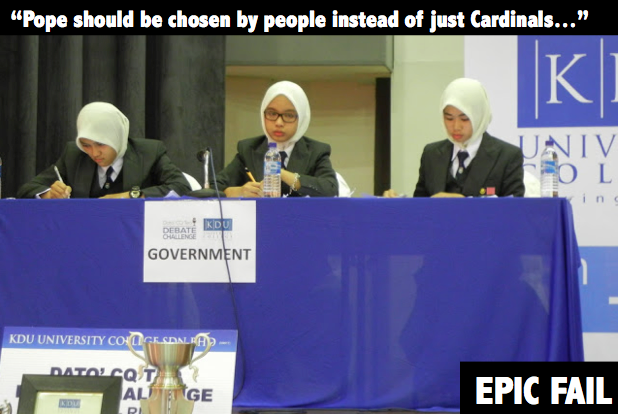
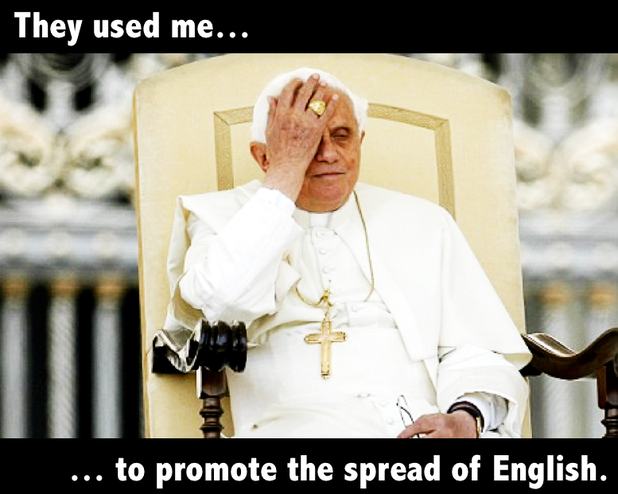
 RSS Feed
RSS Feed
